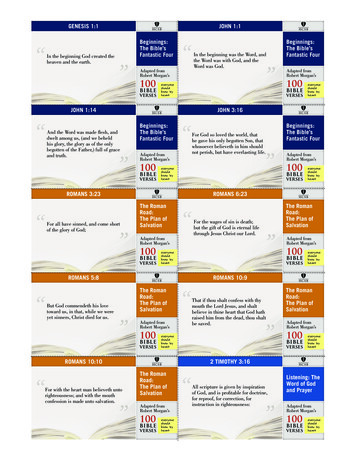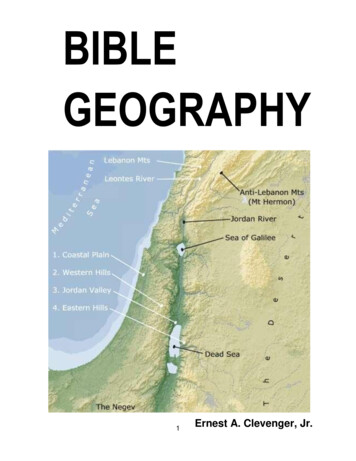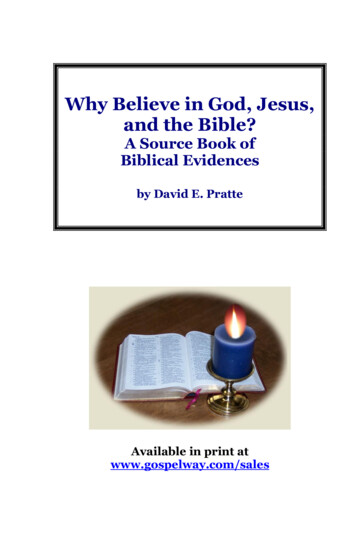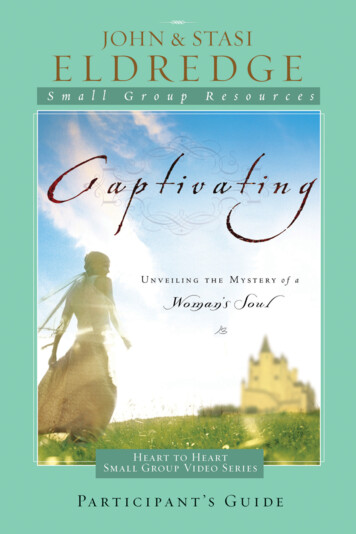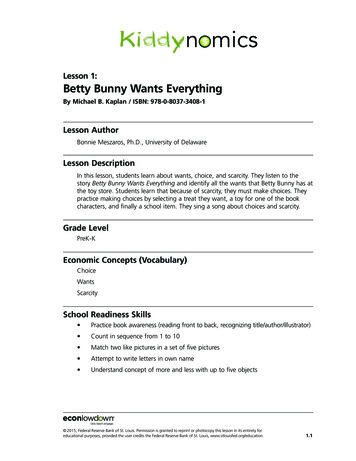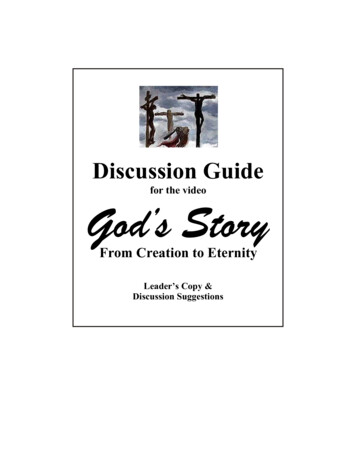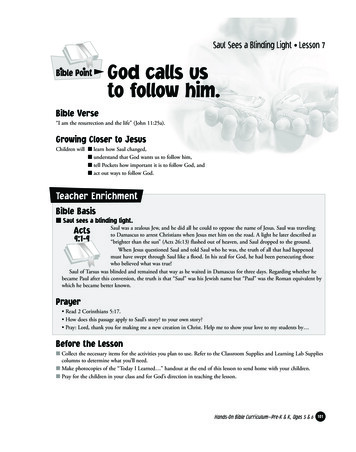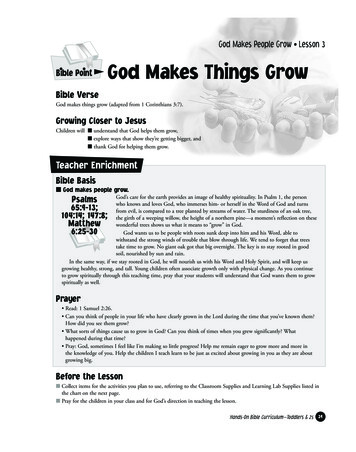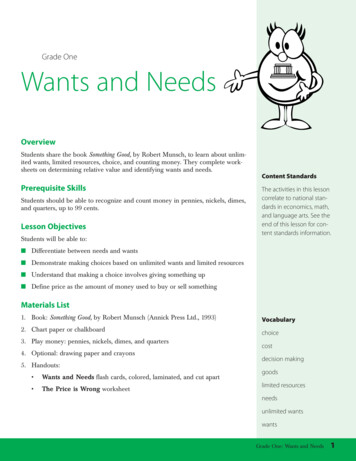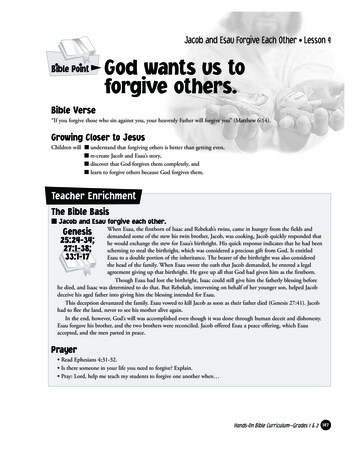
Transcription
Praise Jesus!Jacob and Esau Forgive Each Other Lesson 9Bible PointGod wants us toforgive others.Bible Verse“If you forgive those who sin against you, your heavenly Father will forgive you” (Matthew 6:14).Growing Closer to JesusChildren will n understand that forgiving others is better than getting even,n re-create Jacob and Esau’s story,n discover that God forgives them completely, andn learn to forgive others because God forgives them.Teacher EnrichmentThe Bible Basisn Jacob and Esau forgive each other.Genesis25:24-34;27:1-38;33:1-17When Esau, the firstborn of Isaac and Rebekah’s twins, came in hungry from the fields anddemanded some of the stew his twin brother, Jacob, was cooking, Jacob quickly responded thathe would exchange the stew for Esau’s birthright. His quick response indicates that he had beenscheming to steal the birthright, which was considered a precious gift from God. It entitledEsau to a double portion of the inheritance. The bearer of the birthright was also consideredthe head of the family. When Esau swore the oath that Jacob demanded, he entered a legalagreement giving up that birthright. He gave up all that God had given him as the firstborn.Though Esau had lost the birthright, Isaac could still give him the fatherly blessing beforehe died, and Isaac was determined to do that. But Rebekah, intervening on behalf of her younger son, helped Jacobdeceive his aged father into giving him the blessing intended for Esau.This deception devastated the family. Esau vowed to kill Jacob as soon as their father died (Genesis 27:41). Jacobhad to flee the land, never to see his mother alive again.In the end, however, God’s will was accomplished even though it was done through human deceit and d ishonesty.Esau forgave his brother, and the two brothers were reconciled. Jacob offered Esau a peace offering, which Esauaccepted, and the men parted in peace.Prayer Read Ephesians 4:31-32. Is there someone in your life you need to forgive? Explain. Pray: Lord, help me teach my students to forgive one another when Hands-On Bible Curriculum—Grades 1 & 2 107
Lesson 9Before the Lessonn Collect items for the activities you plan to use, referring to the Classroom Supplies and Learning Lab Supplies listed inthe chart.n Make photocopies of the “Growing Together” handout (at the end of this lesson) to send home with your children.n Pray for your students and for God’s direction in teaching the lesson.This Lesson at a GlanceWhat Children Will DoClassroom SuppliesWelcomeWelcome!—Receive a warm“Leaders Name Tags” (p. 83),scissors, markers, tapeAttentionGrabberSay You’re Sorry—Play aMasking tapeBrotherly Conflicts—Act outthe story of Jacob and Esau fromGenesis 27:1-38.BibleThe Rest of the Story—TryBibleWho’s There?—Dress eachother up, and then try to guesswho their disguised partner is.Assorted dress-up items suchas hats, coats, and shirts; tape;blindfoldsNo Way—Play an “impossible”Bible, treatsBibleExploration &Applicationwelcome from the teacher andmake name tags.game two ways to see if sayingthey’re sorry makes a difference.to guess how Jacob and Esausettled their differences, andthen hear the conclusion of thestory from Genesis 33:3-4.game, and learn from Acts13:38 that God’s forgiveness iscomplete.ClosingI’m Sorry Not!—Discoverthe difference between true andfalse forgiveness.108 Hands-On Bible Curriculum—Grades 1 & 2Learning Lab Supplies
Jacob and Esau Forgive Each OtherWelcomeSUPPLIES: “Leaders Name Tags” (p. 83), scissors, markers, tape Greet each child individually with an enthusiastic smile. Thank each child for coming to class today. As children arrive, ask them about last week’s “Growing Together”discussion. Use questions such as “Were you a peacemaker lastweek? How?” and “Why does God want us to get along with oneanother?” Say: Today we’re going to learn that God wants us to forgive others. Hand out the name tags children made during Lesson 6, and help children attach thename tags to their clothing. If some of the name tags were damaged, or if childrenweren’t in class that week, have them make new name tags using the photocopiablehandout. Tell children that the attention-getting signal you’ll use during this lesson will beblowing the bird whistle. Ask children to respond by raising their hands. Rehearse thesignal with the children, telling them to respond quickly so you’ll have plenty of timefor all the fun activities planned for this lesson.Attention GrabberIt’s important to say the Bible Pointjust as it’s written in each activity.Repeating the Bible Point over andover will help children remember itand apply it to their lives.n Say You’re SorrySUPPLIES: masking tapeBefore this activity, tape a line down the center of the floor. Have children formtwo groups, and have groups line up single file, facing each other, at opposite ends ofthe tape.Say: We’re going to play Say You’re Sorry. When I switch the lights off andon, I want both groups to start walking heel-to-toe on the line toward eachother. When you meet people coming toward you, try to step around them,but still try to keep your feet on the line. You might bump into each othera little bit. When you bump someone else, say, “I’m sorry.” When someonesays “I’m sorry” to you, say, “I forgive you” to the person. Ready? Go.When all the children have walked along the line, say: Now let’s go back thesame way, only this time there will be no talking. Ready? Go.When all the children have again walked along the line, have them sit in a circle onthe floor.Ask: What was it like walking along the line the first time? (It was fun; itmade me laugh; it was noisy with everybody saying sorry.) What did you think of walking the line the second time? (It seemed harder;it wasn’t as much fun; I felt nervous.)Say: Maybe the game wasn’t as much fun when people didn’t say theywere sorry for bumping you. In real life when people do something hurtfuland we aren’t sure why they did it, it can be hard for us to understand.Ask: What would it be like in real life if people never said they weresorry? (Sad; I would feel bad; people would be mean all the time.)Hands-On Bible Curriculum—Grades 1 & 2 109
Lesson 9 What would it be like if we couldn’t tell God we were sorry? (It would bescary; I wouldn’t like it; I would feel bad.)Say: We can always tell God we’re sorry. And if we mean it and ask Godto forgive us, he always will. And we should do the same thing for otherpeople. In our Bible verse for today, Matthew 6:14, this is what it says: “Ifyou forgive those who sin against you, your heavenly Father will forgiveyou.” The Bible verse is saying that God will treat us the way we treat otherpeople. We want God to forgive us when we’re sorry, and God wants us toforgive others when they say they are sorry. Our Bible story today is aboutforgiveness. Let’s listen.Bible Exploration & Applicationn Brotherly ConflictsThere are several ways to choosechildren. Use what works best withyour class.1. You choose—You probablyknow who will want to performand who will be too shy.2 . Ask for volunteers—Say, “Weneed someone to play Jacob.Who’d like to try?”3. Take a chance— Put each character’s name on a slip ofpaper, and let the children drawa part “out of the hat.”If you have enough children, it’s OKto assign boys’ parts to boys andgirls’ parts to girls. But remember,acting is pretending, so it’s also OKto have boys play girls and girlsplay boys.This is a long story, so keepit moving quickly. Use lots of expression to keep children’si nterest.SUPPLIES: BibleOpen your Bible to the book of Genesis.Say: The Bible story today comes from the book of Genesis in the Bible.Today’s story would make a good movie or play. Let’s use our imaginationsand act it out.Choose two children, one to play Jacob and one to play Esau.Have the other children sit in a large circle. Jacob and Esau should sit in the circlewith the others until time to go “on stage.” All the space inside the circle is the stage.Guide the children in their actions by suggesting the ideas in parentheses.Say: Now we’re ready to start the play. I’ll read the story, and we’ll letthe actors show us what happened. Everybody else has a job, too. Everytime something bad happens, softly say “boo.” Ready? Here we go. The storyis underlined where children should say “boo” so you can prompt them when necessary.This is a true story about twin brothers. The first twin was born withskin like a red hairy robe, so they named him Esau (Esau crawls into the circleand stops) because it means “hairy.” (Have children rub their arms.) Esau’s twinbrother was holding on to Esau’s heel when he was born. (Jacob crawls intothe circle and touches Esau’s heel.) So they named him Jacob because it soundedlike the word for “heel.” (Have children touch their heels.)When the brothers grew up (they both stand), Esau became a good hunter.(Esau acts out hunting with a bow and arrow.) Let’s all pretend that we’rehunters like Esau. (Have children stand up and act out hunting with a bow andarrow and then sit back down in the circle.)Esau spent a lot of time finding food. (Esau leaves the circle.) His brother,Jacob, was quiet. He liked to stay home and help his mother. (Jacob acts outgathering wood for a fire in the center of the circle.)One day Jacob was cooking soup (Jacob pretends to stir soup over the fire)when Esau came in, tired and hungry from a hunting trip. (Esau walks slowlyinside the circle, showing hunger.) What do you think Esau said to Jacob? (Havethe children suggest things for Esau to say.)Esau asked for some of Jacob’s soup. Jacob said Esau couldn’t have any110 Hands-On Bible Curriculum—Grades 1 & 2
Jacob and Esau Forgive Each Otherunless Esau gave him the rights that the firstborn son got (boo). That meanttheir father would give the best land and animals to Jacob instead of Esau—all for a bowl of soup! Esau was so hungry that he thought he might die if hedidn’t get something to eat, so he agreed (they shake hands; boo), and Jacobfed him. (Jacob pretends to give Esau food.)This is the end of part one. Jacob and Esau, take a bow.Clap for the performers, and have them join the rest of the class in the circle.Ask: What do you think of the trade Jacob and Esau made of the soupfor the land and animals? Was it fair? (No, Jacob got a better deal; no, Esaumust’ve been pretty hungry to give all that away.) Has anybody ever tricked you? What did you do about it? (Yes, my bigbrother tricks me all the time, and it makes me want to get even with him; yes, whenpeople trick me, I want to get back at them.)Say: Jacob knew he was being unfair to his brother, but he did it anyway(boo). Let’s find out what happened next.Choose a new Jacob and Esau. Choose two others to play Rebekah and Isaac. HaveIsaac sit down in the center of the circle and squint to show that he can’t see well.Rebekah should sit behind Isaac.Say: Now we’re ready for part two.Isaac was the twins’ father. Isaac was old, and he couldn’t see clearly.(Isaac squints again and reaches out his hand in front of him as if he’s blind and can’tsee what’s there.) One day he called Esau (Esau enters the circle and kneels in frontof Isaac) and said, “Go hunting for an animal for me to eat, make me a specialmeal, and I’ll bless you before I die.” (Isaac points outside the circle.) Isaacthought it was time to give Esau the gifts that the oldest son was supposedto get. So Esau went out to hunt. (Esau leaves the circle and sits down.)All this time, Rebekah, the boys’ mother, was listening to Isaac. (Rebekahstands up.) She told Jacob (Jacob goes to Rebekah) everything she’d heard. Thenshe said (Rebekah whispers in Jacob’s ear), “Get me two goats, and I’ll cook themthe way your father likes. You take him the food, and you’ll get the blessinginstead of Esau” (boo). Let’s pretend we are whispering a secret to eachother. (Have children pretend to whisper something in the ear of the person sittingnext to them; then draw their attention again to the center of the circle.)Jacob was shocked (Jacob looks shocked) and said, “I can’t do that. Esauis hairy! If Dad touches me, he’ll know I’m not Esau.” But Jacob did whathis mother had said, even though it wasn’t a nice thing she had asked himto do (boo). He brought her two goats. (Jacob goes out of the circle and bringsback make-believe goats.) Rebekah cooked them (Rebekah pretends to cook), andthen she gave Jacob some of Esau’s clothes to wear. (She gives him makebelieve clothes, and he puts them on.) Finally, she put pieces of hairy goatskin onJacob’s hands and neck. (She pantomimes this.)Then Jacob pretended to be his brother, Esau (boo), and took the food tohis father. (He carries make-believe food to Isaac and kneels in front of him.)Isaac was suspicious. That means that something didn’t seem right tohim, and he was wondering why. Isaac wanted to know how Esau got backso fast. Jacob said, “God helped me find an animal quickly” (boo). Why doyou think Isaac had a hard time believing that Jacob was really Esau? (Havechildren shout out answers.)Bible InsightThe birthright that fathersbestowed upon theirfirstborn sons in Israel carriedwith it privileges as well asresponsibilities. The firstbornson was the object of specialaffection in his parents’eyes, and he was entitled toreceive a double portion ofthe estate. He was consideredthe priest and the head ofthe family. The firstborn sonwas also expected to providefood, clothing, and othernecessities for his motheruntil her death and for hissisters until they married.Hands-On Bible Curriculum—Grades 1 & 2 111
Lesson 9Isaac was still suspicious. He said, “Come near so I can touch you and seeif you’re really Esau.” (Jacob scoots close to his father, and Isaac touches the backof Jacob’s hands.) “You sound like Jacob, but you feel like Esau. Are you reallyEsau?” Jacob said “yes” (boo). (Jacob nods yes.)Then Isaac ate the food (he pretends to eat) and blessed Jacob. (Isaac puts hishands on Jacob’s bowed head.)Just then Esau came in from hunting. (Esau comes in.) Isaac said, “Whoare you?” Esau answered, “I’m your firstborn son, Esau.” Isaac was upsetbecause he’d been tricked. (Isaac stands and shakes his head.) Esau said, “Blessme, too, Father.” (Esau gets down on his knees.) But Isaac said, “No, I can’t. It’stoo late.”This is the end of part two. Let’s clap for the actors. Lead the applause, andgather the children.Ask: That was a sneaky trick. How do you think the mom, Rebekah, andher younger son, Jacob, felt about what they did? (I bet they were scared to doit; excited; afraid; I bet they thought it was good when they got away with it.) How about the dad, Isaac, and the older brother, Esau? How do youthink they felt? (Sad; angry; confused; I think they wanted to get even.) If you were Isaac or Esau, would you want to forgive Rebekah andJacob? (Yes, I know God would want me to; no, I’d rather get even with them.)Say: People sometimes do mean things to each other. When someonedoes something mean to us, it can make us so angry that we want to hurtthem back. But God wants us to forgive others. Let’s find out if Jacob andRebekah were forgiven.n The Rest of the StoryFirst- and second-graders havevery definite ideas about whatis fair and what’s not. Theyunderstand when they (andothers) deserve punishment. Theyalso understand the power offorgiveness. Watch for teachablemoments during class whenyou can help kids understandGod’s grace in forgiving us and toencourage them to follow God’sexample by forgiving others.SUPPLIES: BibleSay: For part three, we’re going to do something different. So far this hasbeen a true story, but before we find out the true ending, let’s think aboutwhat might’ve happened.Have children form pairs. Say: The end of the story took place many yearslater. The brothers were older. They both had big families and wereimportant men. They hadn’t seen each other in a long time. One day theymet again.Assign each pair one of these “what if” situations, and have the pair come up withan ending of the story to act out.1. What if they were both still angry? What would they say to each other?What would they do?2. What if Jacob was sorry he tricked Esau, but Esau was still angry andwouldn’t forgive Jacob?3. What if Esau was not angry with Jacob anymore, but Jacob stillthought it was OK to trick Esau?4. What if Jacob and Esau were both sorry and wanted to forgive eachother?Allow two minutes for pairs to work on their skits. Have each pair present its skit.Then gather the children again.112 Hands-On Bible Curriculum—Grades 1 & 2
Jacob and Esau Forgive Each OtherAsk: Which ending is your favorite? Why? (I think it would be good if theyboth wanted to forgive each other; I think Esau stayed mad because I would stay mad ifmy brother did that to me.) Which ending do you think really happened? (I think Esau was still mad atJacob; I think they forgave each other.)Say: The Bible tells us the two brothers forgave each other and lived inpeace. Read Genesis 33:3-4 aloud.Ask: Why do you think they forgave each other instead of staying mad?(Because that’s what God wanted them to do; maybe they’d been mad so long theiranger just went away; maybe they missed being good friends.) How do you think they felt after they forgave each other? (I think theywere happy; I bet they were glad to act like brothers again; I think Esau would still bemad about how Jacob tricked him.)Say: God wants us to forgive others just as Jacob and Esau did.HANDS-ON BIBLEYou’ll need several magazines, one shoe box per child, and enoughsafety scissors and glue to share.Say: Ever since the first day of creation, family has beenimportant to God. As we have learned in our Bible story, though,sometimes people in families do mean things and hurt one another. Godwants us to forgive others, especially p eople in our own families, becausefamilies are very valuable to God.Have kids open their Hands-On Bibles to Genesis 25. Say: I’m going to giveyou a chance to create a place to save all your memories and things you valueabout your family.Read aloud the instructions for the “Let’s Make a Deal” activity in Genesis 25 oftheir Hands-On Bibles and assist children in creating their treasure boxes.Ask: What is one thing that you value about your family? (I like eatingTV dinners with them; I like playing cards with my family; I like when my dad readsme bedtime stories.)First- and second-graders are bytheir nature self-centered. Mostyoung children want to be first,want to be noticed, and wantto be the center of attention. It’snot a fault; it’s just where they aredevelopmentally. Understandingthat such behavior is normal forthis age can help you deal withyour kids with patience andunderstanding. Remember thatunder your gentle guidance, children can begin to learn themeaning of humility. Think of one thing you’d like to put in your treasure box, and tell uswhy. (A necklace my parents gave me because they love me; a sparkly pen mysister gave me when I learned to write, because she was proud of me.)Say: Find a friend to pray with. Help them find partners. I want you to prayfor each other’s families. First, thank God for your friend’s family, and thenpray that God will help them always remember to love one another andforgive each other. Take turns praying, starting with the shortest person inyour pair. Give kids about a minute to take turns praying.Hands-On Bible Curriculum—Grades 1 & 2 113
Lesson 9n Who’s There?Some children object to w earingblindfolds or anything that c overstheir eyes. Be sensitive to theirfears. If children resist havingsomething put over their eyes,have them close their eyes instead.SUPPLIES: assorted dress-up items such as hats, coats, and shirts; tape; blindfoldsSay: In today’s Bible lesson, Jacob dressed up ashis older brother, Esau, and tricked their father intogiving him Esau’s blessing. Let’s see how good we are atdressing up and pretending to be somebody else.Have children form pairs. Have one child in each pair puton a disguise, and have his or her partner help with the dress up.Encourage children to use the props creatively. A child couldwear the black-rimmed eyeglasses or the mylar wig or a half-maskas is, for example, but he or she could also tape on a piece of fakefur as a mustache or wear the wiggle snake around the neck like anecklace or coil it around the wrist like a bracelet. If you broughtin assorted dress-up items such as hats, coats, or shirts, makethose available for use, too.Once the children are dressed up, put a blindfold on the other partner, and thenhave all the dressed-up children switch places so everyone has a new partner. Tell theblindfolded partner to touch his or her new partner’s face and try to guess who it is.After a few minutes, let the blindfolded children take off their blindfolds and seewho their partners are. Have children switch roles and play the game again.Then ask: What was the most fun about dressing up? (Wearing the wig;pretending I had a moustache; pretending I was somebody else.) Was it easy or hard to guess who your new partner was? Explain. (It waseasy because she wears glasses and I heard her giggle; it was hard because I couldn’t seeanything.) Do you think it was easy or hard for the brother in our Bible story tofool his father? Why? (I think it was hard because he didn’t look or sound like hisbrother; I think it was easy because his father couldn’t see well.) Do you think our game was like or unlike the Bible story we heard?Explain. (I think it was like it because Jacob dressed up, too, and tricked his dad; it wasdifferent because we weren’t trying to trick anyone.) Have you ever had someone trick you? (Yes, my brother tricked me andlocked me in the basement for an hour; no, I’ve never been tricked; yes, my friendtricked me and scared me when she hid in my closet and then jumped out.) How can you show God’s love and forgiveness to people who havetricked you? (I can tell my brother that I forgive him; I can give my sister a hug andlet her play with my toys; I can tell my friend that I love her and so does Jesus.)Say: We were just playing a game, and no one was really trying to trick anybody else. But sometimes people try to trick others for real. It can behard to forgive people when they’ve tricked us. But God wants us toforgive others. After a while, Esau forgave Jacob and wasn’t mad at Jacobanymore. We are showing God’s love when we forgive people and love themno matter what they do.Do you remember our Bible verse for today? It comes from Matthew6:14, and it says, “If you forgive those who sin against you, your heavenlyFather will forgive you.” God loves us and wants us to show his love to otherpeople. Now let’s play a game to help us learn how much God loves us andhow much we should love others.114 Hands-On Bible Curriculum—Grades 1 & 2
Jacob and Esau Forgive Each Othern No WaySUPPLIES: Bible, treatsGive each child a walnut-sized piece of modeling clay. Havethe children form balls with their clay. Also give each child threefelt dots.Say: I have a trick I want you to do with your clayball. If you do it correctly, you get to keep all of yourfelt dots. Each time you make a mistake, it’ll cost youone felt dot. To win the game, you have to keep all your dots. First, tossyour clay ball into the air and catch it. Keep tossing and catching. If anyonedrops the clay ball, collect a felt dot from him or her.After a few seconds, say: Now, toss your clay ball up and catch it withone hand. Have the children continue tossing and catching. Collect a dot for eachdropped ball.Stop the game as soon as everyone has lost at least one dot.Ask: Does anyone still have all three dots? (No, we all made mistakes; no,this game was too hard.)Say: I guess nobody won the game. I feel bad because I wanted all of youto win, so I think I’ll give back your dots. Return the dots to the children so theyeach have three again. Collect the clay, and save it for another lesson.Now we can say you all won, and you can trade in your dots for a prize.Collect the dots, and save them for another lesson. Give each child a small treat.Gather the children, and ask: What did you think when I decided to let youall win? (I was glad because I didn’t think I had a chance; it still seemed unfair thateveryone got to win, because I did better than everyone else.) Have you ever deserved to be punished but not been punished? Tellme what happened. (Yes, once I got into the cookie jar right before dinner, butmy dad didn’t punish me when he found out; no, I always get punished when I dosomething wrong.)If some children are skilledcatchers, make the task moredifficult by having the childrentoss the balls up and catch thembehind their backs.If children talk about thingsthey’ve gotten away with ratherthan things they’ve been forgivenfor, ask them to explain what thedifference is.This would be an excellenttime to explain your church’sunderstanding of the plan ofsalvation.Say: In this game, you couldn’t be perfect becausethe game was too hard. None of us can do everything perfectly. Some people can run fast, and others can’t.Some people can sing beautifully, and others can’t. Wecan’t be the best at everything, and that’s OK.But God wants us to always do right because doingwrong things separates us from him. We call thosewrong things sin. Even when we do wrong things by accident, westill get separated from God. Our sin gets in the way.If that were all there is to it, nobody could win because everyonesins sometimes. We’d all be separated from God’s love forever. ButGod sent Jesus so we could ask for forgiveness. Listen to what theBible says in Acts 13:38. Read Acts 13:38 aloud. Then ask: When people forgive you for something you’ve done, do youwant them to keep talking about it? Explain. (No, because it’s over; no,because I’ve already said I was sorry; no, because they’ve already forgiven me.)Hands-On Bible Curriculum—Grades 1 & 2 115
Lesson 9 When you throw something away, do you keep taking it out ofthe trash again? Why or why not? (No, because it’s trash; no, I don’t wantit anymore; no, it’s gone.)Say: God sent Jesus to earth to die for our sins. When we believein Jesus and are truly sorry for our sins, God will forgive us. WhenGod forgives us for a wrong thing we’ve done, it’s like he throws thatwrong thing away. Once God forgives us, he never even thinks aboutthat wrong thing again. That’s true forgiveness. And that’s how hewants us to forgive other people. God wants us to forgive othersjust as he forgives us. And when we’re forgiven, we can be friendswith Jesus for always.Closingn I’m Sorry.Not!SUPPLIES: noneGet the ooze from the Learning Lab. Leave it inside its container.Gather the children in a circle, and say: I want you to pass thisaround the circle just as I do and say the same thing I do.Say: I’m sorry. Pass the ooze to the child on your right. When theooze has gone all the way around the circle and has come back to you, ask: Why did we say “I’m sorry”? (Because you said to; you didn’t tell us why.)Say: This activity is a little bit like saying “I’m sorry” without really meaningit. Sometimes we don’t even know what we’re supposed to be sorry for.Ask: Have you ever said “I’m sorry” when you didn’t mean it? Whathappened? (Yes, my mom made me say I was sorry when I hurt my sister, but Iwanted to hurt her; yes, my dad made me say I was sorry, but I didn’t even know whatI’d done wrong.) Has someone ever told you “I’m sorry” but you didn’t believe theymeant it? Why did you feel that way? (My sister told me she was sorry for yellingat me, but then she yelled at me again; my friend said he was sorry for saying somethingmean about me, but I didn’t believe him.)Say: When people say they’re sorry but they don’t mean it, forgivenessdoesn’t really touch them, just as the ooze didn’t really touch our hands.Now take the ooze out of the container. Say: As you pass the ooze this time,think of something you’ve done that you’re really sorry about. You don’thave to say what it is unless you want to. Just say, “I’m sorry,” and pass theooze to the person next to you.Start the passing game by thinking of something you’re sorry for. Then pass the oozeto the child on your left.When the ooze comes back to you, ask: How was this time different from the first time? (This time I really meantwhat I said; I thought of something I was sorry about.) Why do you think it’s important to really feel sorry when you say youare sorry? (Because if you aren’t sorry but you say you are, you aren’t being honest;because the person can’t believe you if you don’t really mean it.)116 Hands-On Bible Curriculum—Grades 1 & 2
Jacob and Esau Forgive Each OtherSay: When we’re really sorry we’ve hurt someone, true forgiveness cantouch us, just as the ooze really touched our hands. Go ahead and smellyour hands. The children’s hands will smell sweet, like the ooze smells.The ooze smells sweet, and you might still smell it on your hands. True forgiveness leaves something behind to sweeten our lives, the way theooze left behind a sweet smell. God wants us to forgive others. Say thatwith me: “God wants us to forgive others.” He also wants us to ask forforgiveness when we do wrong. Then we will make our lives and otherpeople’s lives sweeter.Pray a closing prayer, asking God to help everyone in class forgive others and ask for forgiveness.Growing closer to Jesus extendsbeyond the classroom.Photocopy the “Growing Together” handout (at the endof this lesson) for this week, and send it home with yourchildren. Encourage children and parents to use thehandout to plan meaningful activities on this week’stopic. Follow up the “Growing Together” activities nextweek by asking children what their families did together.Hands-On Bible Curriculum—Grades 1 & 2 117
Leadersthe Faith of9:God wantsus toforgiveothers.seKey Ver,osnonwhrohsiase imhdeahvasinmuryonodu,anyo,trdnsaieahagedu”for thosepearyoreivprgfoashillwodGatwh14”).e h6:imewlov
Hands-n Bible CurriculumGrades 1 & 2 107 Praise Jesus! Bible Point. Bible Verse “If you forgive those who sin against you, your heavenly Father will forgive you” (Matthew 6:14). Growing Closer to Jesus. Children will n. understand that forgiving others is bett
